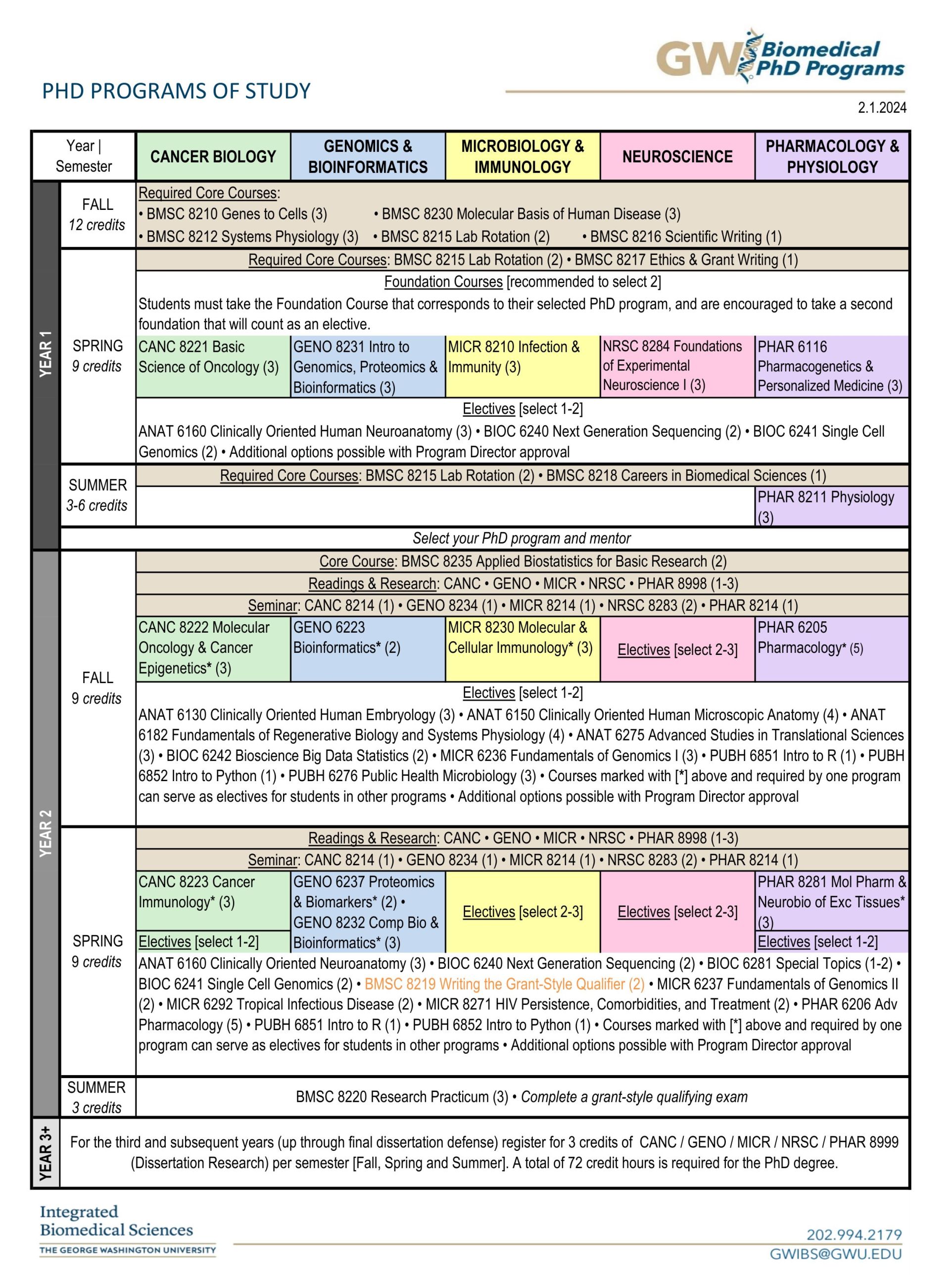Program Structure
All of the IBS PhD programs are full-time, year-round, on-campus only. Part-time, hybrid and online options are not available. The programs require a full-time, year-round commitment to research in an affiliated faculty laboratory alongside the prescribed coursework. We admit new students once per year in the Fall semester only.
The First Year
In the fall semester, students take Genes to Cells, Systems Physiology, and Molecular Basis of Human Disease, along with the first lab rotation (approximately September-December; use the Lab Rotation Form) and the first career skills course, which focuses on scientific writing and speaking.
In the spring semester, students take the second lab rotation (approximately January-April; use the Lab Rotation Form), and the second career skills course, which focuses on ethics and grantsmanship. They also begin to choose from courses specific to the various PhD programs (see the PhD Program of Study Chart below). In the “summer” of the first year (approximately April-June; use the Lab Rotation Form), all students take a third lab rotation and the Careers in Biomedical Sciences seminar. Coursework and rotations are expected to assist in guiding the student toward the ultimate choice of Ph.D. programs. All students should complete an Individual Development Plan using MyIDP before participation in the Career Panel
Fall, First Year
- Genes to Cells (3 credits)
- Systems Physiology (3 credits)
- Molecular basis of Human Disease (3 credits)
- First Laboratory Rotation (2 credit)
- Career Skills: Scientific Writing and Speaking (1 credit)
Spring, First Year
- Second Laboratory Rotation (2 credit)
- Career Skills: Ethics and Grantsmanship (1 credit)
- One or more Foundation course:
Basic Science of Cancer Biology (3 credits)
Infection and Immunity (3 credits)
Genomics, Proteomoics and Bioinformatics (3 credits)
Foundations of Conceptual and Experimental Neuroscience (3 credits)
Pharmacogenomics and Personalized Medicine (3 credits)
- Plus other electives
Summer, First Year
- Third Laboratory Rotation (2 credit)
- Career Skills: Biomedical Science Careers (1 credit)
- Select research mentor and PhD program
Rotations, Mentor and Program Selection. Selection of the thesis research mentor, and associated PhD program, generally occurs at the end of the first year. Research rotations are critical for students in becoming familiar with ongoing research projects and choosing their dissertation laboratory. A list of IBS faculty interested in hosting rotation students is provided, and only one rotation student may be in a faculty lab at a time. For students who have previous experience with an IBS trainer laboratory, only one rotation may be performed in that laboratory. By the end of the first year, it is expected that the student will have selected a program and will have identified a research mentor and PhD program.
In exceptional cases, additional rotations in the summer or fall are required. Please use the Program Selection Form.
2nd Year Curriculum
In the fall semester, all students take applied biostatistics for basic research, a PhD program-specific seminar series, and readings and research with their research mentor, as well as remaining required and elective courses specific to the various PhD programs. Students are strongly encouraged to take electives across different PhD programs that are relevant to their research. See the PhD program courses here.
In the spring semester, students continue the program-specific seminar series and readings and research with their research mentor, as well as remaining required and elective courses specific to the various PhD programs. See the PhD program courses here. Students should begin planning their grant-style qualifier.
Fall, Second Year
- Readings and Research 8998 (with mentor)
- Applied Biostatistics for Basic Research (2)
- Seminar course for the specific PhD program (1-2)
- Additional Required and Elective courses for the specific PhD program
Spring, Second Year
- Readings and Research 8998 (with mentor)
- Seminar course for the specific PhD program (1-2)
- Additional Required and Elective courses for the specific PhD program
- Complete grant-style qualifier examination, advance to candidacy
Grant-style qualifier, committee selection
Effective preparation of fellowship grant applications is required for a successful career in academic research, and garnering support for research ideas is key in additional career sectors. Thus, the grant-style component is both a training exercise to develop research competencies and serves as a qualifying exam for the PhD advancement to candidacy. Students should be able to develop a novel line of research, propose a hypothesis, and develop a series of experiments to test that hypothesis. A student must also be able to defend the proposal at an oral examination. At the time of the oral defense, the student should also demonstrate knowledge of the larger field of the general area of the proposal and material covered in completed coursework. The ability of a student to accomplish this endeavor will represent the qualifying exam. Details on both the roles of the faculty members and the guidelines for the students are contained in the IBS student handbook. Please use the Qualifier Exam Form.
Third year and beyond:
Dissertation research continues, with thesis advisory committee meetings and reports due every semester to ensure good progress. Students are likely to be engaged in research, preparation of publications, and presentations at meetings. Students register for Dissertation research 8999. Please consult the Guidelines when preparing for graduation. Following satisfactory completion of the dissertation and oral defense of the dissertation research, the PhD is conferred. General requirements for Biomedical Science Ph.D. programs are the satisfactory completion of a minimum of 72 credit hours of approved graduate course work for students whose highest earned degree is a bachelor's or a minimum of 48 credit hours for those whose highest earned degree is a master's in a relevant field.
GW Bulletin course descriptions
